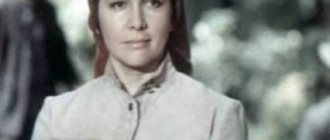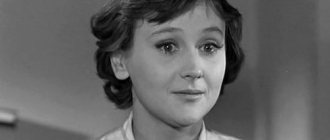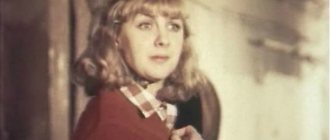Childhood and youth
Kira Muratova was born into a difficult family living in the town of Soroki in Bessarabia (Romania). Father Yuri Aleksandrovich Korotkov worked as secretary of the underground regional committee of the Communist Party of Romania before the war with the Germans, and in 1941 he died as part of a partisan detachment.
Director Kira Muratova
Mother Natalya Isaakovna, Jewish by nationality, was a member of the Romanian Communist Party since 1928. After the war, the woman took the chair of the Minister of Culture of the republic, which became part of the USSR.
In an interview, Kira Georgievna recalled that she often visited her mother at work. The ministry had a separate room for watching foreign films, and I especially remember the special pass that the girl received from her parent.
Kira Muratova in her youth
The piece of paper opened the doors of any cinema in Bucharest, and little Kira often ran to shows after school. At that time, during breaks in the foyers of cinemas, the audience was entertained by magicians and singers. One day the girl saw a “live” celebrity, Petro Leshchenko, and was impressed for a long time.
After graduating from school, young Kira went to the capital of Russia, where she entered the Faculty of Philology at Moscow State University. After some time, she realized that cinema attracted her, and decided to try her luck at VGIK. The girl entered the director's department, falling under the wing of the famous cinema masters Sergei Gerasimov and Tamara Makarova.
Girl with Romanian citizenship
Kira Georgievna Muratova (maiden name - Korotkova) was born on November 5, 1934 in the current regional center of Soroca, Republic of Moldova. At that time, this place was located on the territory of the Romanian Kingdom. Kira's father worked as an engineer, and her mother Natalya Isaakovna was a gynecologist. Both were members of the Romanian Communist Party, lived in Bucharest, and then in Chisinau.
Kira Muratova in her youth
With the outbreak of the war, Kira and her mother were evacuated to Tashkent, and her father remained to organize the work of the underground, but was shot in 1941. Until the end of the 80s, Muratova retained Romanian citizenship, although this caused her problems during admission, which her mother, an authoritative party member and an honored doctor, managed to resolve.
Movies
In 1961, Kira Muratova, as a director, joined her colleagues at the Odessa Film Studio. At first, she worked in tandem with her husband Alexander Muratov, with whom she joined forces back in her institute days. The couple showed the world the films “At the Steep Yar” (1962) and “Our Honest Bread” (1964).
Still from Kira Muratova’s film “Brief Encounters”
The aspiring director made her solo debut in 1967. The viewer received a brilliant work that leaves no one indifferent - “Brief Encounters”. The touching melodrama about a love triangle is notable for several aspects.
Muratova herself starred in the film, the main male role was played by the legendary Vladimir Vysotsky, and the second main female role was played by Nina Ruslanova, appearing on Soviet screens for the first time. The film was released in a limited edition; a full-fledged screening happened only 20 years later – then more than four million Russians appreciated the director’s solo work.
Still from Kira Muratova’s film “The Long Farewell”
The next film, “The Long Farewell” (1971), turned out to be completely unhappy. The management of the studio did not appreciate the master’s creativity, coordinating the work for two whole years, and as a result, the show was postponed until perestroika. Kira Muratova, removed from directing, could not stand the oppression and left Odessa.
The woman settled in Leningrad, where at the Lenfilm film studio she began creating the film “Exploring the White World,” which delighted viewers in 1978. A heartfelt, beautiful story brought together Nina Ruslanova, Alexey Zharkov, and Lyudmila Gurchenko on the set. After watching, it becomes clear where Renata Litvinova, a loyal fan of Kira, drew inspiration for her first steps in directing.
Still from Kira Muratova’s film “Among the White Stones”
Censorship was hot on Muratova's heels. The film “Among the White Stones” (1983) turned out to be scandalous, from which unwanted things were mercilessly cut out. So much so that Kira Georgievna refused to indicate her name in the credits.
Only towards the end of the Soviet Union did the director breathe a sigh of relief, having the opportunity to create as her heart dictated. With her light hand, “Change of Fate” and a two-part drama with a sharp social overtone “Asthenic Syndrome” appeared on the screens.
Still from Kira Muratova’s film “Asthenic Syndrome”
The last film created a sensation among critics and viewers - both in its content, composition, and special presentation techniques (one part was shot on black and white film, the other on color). In addition, for the first time in Russian cinema, the director allowed obscene language to be heard from the screen. However, the attacks at home passed in the background, because the main thing that Muratova achieved was recognition abroad: the work received a special jury prize at the Berlin Film Festival.
Still from Kira Muratova’s film “The Adjuster”
The next notable work was born at the height of perestroika. In 1994, Kira Muratova first directed the shocking Renata Litvinova in “Hobbies,” who became the director’s muse. Moreover, there was no role for her in the script initially; Kira later came up with the character on purpose. Muratova spoke about her first impression of the actress:
“We met at the Arsenal festival in Riga. It immediately seemed to me that she should be filmed, she has wonderful appearance and manner of speaking.”
This picture is calm, bright, but ambiguous, oh. Kira will star as an actress with blond hair several more times in the future: Renata shines in the thriller “Three Stories,” which was nominated for the Berlin Golden Bear, in the drama-comedy “The Tuner,” the tragicomedy “Two in One,” and the social drama about minors street children "Melody for a barrel organ." All films won one or another award.
Still from Kira Muratova’s film “Eternal Return”
In 2012, Kira Muratova presented fans with the comedy “Eternal Return,” in which Oleg Tabakov, Alla Demidova, and Sergei Makovetsky starred along with Litvinova. With this work, Kira Georgievna put an end to her directorial career, publicly announcing her retirement.
Kira Muratova also worked as an actress with other directors. The woman appeared in the role of a revolutionary in the film “Dangerous Tours” directed by Georgy Yungvald-Khilkevich. In 1986, she was invited to the drama “Garden of Desires” by Ali Khamraev, where Kira reincarnated as a witch.
Oleg Tabakov. Biography
In 1971, Muratova made the film “Long Farewell” about the relationship between mother and son, based on the script by Natalia Ryazantseva. However, this picture was not destined to appear immediately. The management of the film studio did not appreciate the film and hid it in a long box. Strict censors saw in this work a contrast between the intelligentsia and the people, which did not fit into Soviet reality. It was released only in 1987 and received an award at the International Film Festival in Locarno and Tbilisi.
Worldwide recognition
Interest in the problems of morals of that time was manifested in the films of Kira Muratova, which not everyone liked. After another scandal with the management, she was forced to leave Odessa for Leningrad, where the film “Exploring the White World” (1987) was born. The film was a success, but critics decided to take special control and editing of the director.
The film “Among the White Stones,” released in 1983, underwent so many changes that Muratova refused to indicate her last name in the credits.
Perestroika brought the director a long-awaited breath of freedom. She got the opportunity to create as her heart dictates. During this period, the films “Change of Fate” (1987) and “Asthenic Syndrome” (1990), filmed in collaboration with her second husband Evgeny Golubenko, were born.
“Asthenic Syndrome” is a two-part psychological drama, in which the fate of the heroes reflects the image of our society of that time. The film created a real sensation among film critics. The film was unusual in every way: the first part was shot in black and white, the second in color, obscene language was heard from the screen for the first time, and American rock was included in the soundtrack. The film was recognized outside the country, and it received a special jury prize at the Berlin Film Festival and the Nika film award for best feature film.
“This is a completely historical film in different senses of the word. Apart from Eisenstein and the Russian avant-garde in general, the Thaw paintings of Khutsiev and the films of Kira Muratova, there were probably no such paintings that would close and open a new era,” this is how art critic Zara Abdullaeva described it.
In the mid-1990s, Muratova was recognized as a classic of “intellectual” cinema, but she made films less and less often.
In 1994, Muratova invited the shocking Renata Litvinova to play the main role in her film “Hobbies,” who became the director’s muse. It was after this role that Litvinova gained fame and entered cinema history. The film "Hobbies" was about.
All films won one or another awards and film awards.
In 2012, Kira Georgievna presented to the public the comedy “Eternal Return”, where the main roles were played by Oleg Tabakov, Alla Demidova, Sergei Makovetsky and Renata Litvinova. The world premiere took place at the Rome Film Festival that same year. After the premiere, the director announced that this was her last film and she was leaving cinema.
Personal life
Kira Georgievna was married twice. She met her first husband, director and screenwriter Alexander Muratov, during her student years, but in the 70s the marriage broke up. The couple raised a daughter, Marianna, who died tragically. The director's couple divorced after Kira's debut film.
Kira Muratova and her husband Evgeny Golubenko
The second husband, with whom Muratova lived until her last days, is also from a creative environment - St. Petersburg artist and screenwriter Evgeny Golubenko.
Uncompromising and unbearable on the set, Kira Georgievna in life was a calm, balanced person, able to get along with anyone. The woman loved to eat deliciously, but she chose simple food. Over the years, Muratova began to look towards vegetarianism, but she never decided to join the ranks of vegans.
Personal life of a hermit
Everything is stable in Kira Muratova’s personal life. True, she lived with her first husband, Alexander Muratov, for only ten years. They met back in their student days, and got married after Kira received a degree in directing.
In 1961, a daughter, Marianna, was born into this marriage (she died tragically). Alexander helped his wife in the creation of several films, but then their paths diverged. Muratov left for Kyiv, and Kira Georgievna and her daughter remained in Odessa.
The second beloved man in her life appeared after a forced move to Leningrad. In the city on the Neva, Kira Georgievna met the artist Evgeny Golubenko. At first, a new acquaintance helped Muratova in creating scripts, and later their relationship went beyond work.
Despite the fact that Evgeniy is two decades younger than his beloved, they still live in Odessa in peace and harmony. You don’t often see Muratova and Golubchenko at social events and festive events ; they prefer to lead a “hermit” life.
They rarely go out to visit, but those who visit them are greeted with interest. Kira Georgievna refuses to write memoirs for now, enjoying every day she lives.
Death
In recent years, Kira Georgievna lived in Odessa and almost never went out into the world.
“I’ve been to a lot of places, and now I don’t want to go anywhere. I don’t want to fly by plane, or by train either,” she admitted.
Journalists who visited the director note that her apartment is amazing - it resembles a museum in which the studio of her artist husband was found. Muratova rarely agreed to interviews; the woman also refused to write memoirs.
Kira Muratova in 2018
In the summer of 2020, the news spread around the cinema world that Kira Georgievna had become a member of the American Film Academy, which received the right to choose who deserves the prestigious Oscar 2018 award.
On June 6, 2020, Kira Muratova passed away. Producer Yuri Minzyanov announced this on social networks.
“Art protects from chaos, even by showing chaos”
Kira Muratova From open sources
Kira Muratova's first short film was called " At the Steep Yar " and was filmed in 1962. She filmed it together with her future husband Alexander Muratov .
Two years later, the full-length film “Our Honest Bread” was released.
Kira Muratova’s first independent work was called “Short Encounters.” It was released in 1967, and Kira Georgievna herself played the main role in the film. Her partner in the film was Vladimir Vysotsky .
Kira Muratova and Vladimir Vysotsky Screenshot
Then Muratova had disagreements with the Odessa Film Studio, and she moved to Leningrad , where she began working at Lenfilm.
There, in 1978, the film “Exploring the White Light” was filmed. There, Kira Muratova met the artist Evgeny Golubenko , who later became her second husband and co-author of the scripts.
The first husband, Alexander Muratov , subsequently answering the question about what was the reason for the divorce - creative or human differences, said the following:
“Yes, both. Together. It is always closely connected. And then, you understand what’s the matter... To some extent, I think that it was great happiness for her that we separated. I'm sure of it. In a creative sense."
“I still suppressed her. Not in such a direct creative way... But just to show yourself to the fullest essence,” he noted.
Filmography
- 1967 — “Brief Encounters”
- 1971 — “Long farewell”
- 1979 — “Exploring the White Light”
- 1983 — “Among the Gray Stones”
- 1987 — “Change of fate”
- 1989 — “Asthenic syndrome”
- 1992 — “Sensitive Policeman”
- 1994 — “Hobbies”
- 1997 — “Three Stories”
- 2001 — “Minor People”
- 2002 — “Chekhov’s motives”
- 2004 — “The Adjuster”
- 2007 — “Two in One”
- 2009 — “Melody for a barrel organ”
- 2012 — “Eternal Return”
Muratova Kira (Ksenia) Georgievna
(née Golovko)
(born in 1934)
Russian director and screenwriter
The director's biography was quite unusual. She was born in Moldova in the family of a famous figure in the partisan movement who died during the war.
Kira's mother was a Romanian activist and member of the Communist Party. After the annexation of Bessarabia to the USSR, the family moved to a new place of residence, but when the war ended, they returned to Romania. There, her mother made a brilliant career, becoming the Minister of Culture of Romania, and until her mother’s death, which followed in the seventies, Kira retained Romanian citizenship.
In 1953, she entered the Faculty of Philology of Moscow State University, but a year later she transferred to VGIK and began studying in the workshop of S. Gerasimov, who distinguished her from other students.
Shortly before graduation, Kira marries Kharkov resident A. Muratov and after the divorce retains his last name. In 1961, together with Muratov, Kira shot a short film “At Steep Yar” at the Gorky Film Studio based on her own script. A little later, in the same co-authorship, the film “Our Honest Bread” will be released, filmed at the Odessa Film Studio. Odessa has become Muratova’s hometown, where she lives, only occasionally coming to Moscow.
One of the Odessa stories about constant water cuts became the basis for the script of the film “Brief Encounters” (1967), in which V. Vysotsky played the main role. Unable to find an actress to play the heroine, Muratova played her herself. The film was highly praised by professionals, but the authorities reacted coolly to it. It received a third rental category, a minimum circulation and several positive reviews. Muratova learned to build a plot using editing techniques, to introduce several motifs into the content of one picture. Twenty years later, Muratova’s film was sold out in Moscow cinemas.
The fate of the second picture turned out to be different. Having touched upon social problems, the relationship between man and government, noting the rightness of anarchy, the director was criticized for ideological miscalculations. Despite the brilliant performance of Z. Sharko in the role of the mother, it was considered unsuccessful and removed from distribution.
A difficult period begins in Muratova’s life. The official authorities perceive her as a dissident and excommunicate her from directing. She works either as a studio librarian or as a museum curator, then separates from her husband.
However, Muratova does not give up. Together with R. Khamdamov, she writes the script “Princess Mary” based on the novel by M. Lermontov. But the film was closed already at the testing stage - the authorities were afraid of the author’s reading of the novel. In 1985, Muratova will continue to collaborate with Khamdamov, becoming his director-editor on the film “I Remember You.”
In 1978, changes occurred in Muratova’s personal life. She meets the artist E. Golubenko, who became her support and the breadwinner of the family. Later he will star in Muratova’s film “Three Stories” in the cameo role of a blind man.
Her creative life will be different. Muratova makes the film “Understanding the White Light” (1978), built under the motto “For the success of our hopeless light” (quote from “The Myth of Sisyphus” by A. Camus). She is trying to find the good from which she can build her world. But for the sake of the acceptance committee, many scenes have to be re-edited. The editing led to the fact that practically nothing was left of the author's intention. The next film - “Among the Gray Stones” based on the story by V. Korolenko “Children of the Dungeon” (1984) - was shortened so much that the director filmed her
last name from the credits. The name Ivan Sidorov that appeared there reflected the defenselessness and instability of the position of the artist, who was unable to achieve the realization of his plan.
The mood created in Muratova’s films contrasted sharply with the generally accepted one: she did not talk about great construction projects and five-year plans, and did not display the image of a happy contemporary. Her characters are lonely, often looking for love or dreaming of personal happiness. Having their own view of what is happening, they are right and at the same time unhappy.
After the start of perestroika, a lot has changed. Muratova receives the USSR State Prize for the films “Short Encounters” and “Long Farewell.” The last film was awarded the FIPRESCI prize at the Locarno Film Festival and the Grand Prize at the All-Union Film Festival in Tbilisi. The title of the painting “Change of Fate” (1987), based on the story by S. Maugham, seems to carry a symbolic meaning, denoting changes in Muratova’s fate. She returns to active creativity.
“Asthenic Syndrome” (1989) did not carry any social charge, but was also sent to the shelf. In it, Muratova tried to talk about the fact that in the human soul there are many complex, interconnected things.
The problems raised by the director turned out to be of concern to the European audience, and in 1990 Muratova received the Silver Bear prize and a special jury prize at the Berlin Film Festival. At the same time, she was awarded the professional Nika prize for the best feature film of the year.
She likes those who do not fit into the surrounding reality, originals and eccentrics. Among the living creatures inhabiting the world, she gives preference to animals and babies - some are dumb, others are not yet spoiled.
“The Sensitive Policeman” (1992) reflected the director’s love for all living things.
Muratova began to base her films on a sharp contrast between the obvious and the existent, and became interested in the theme of death. The screening of the film "Hobbies" caused a mixed reaction, and at the festival in Berlin the director was accused of hating people. But the jury awarded the film a special prize; it later received the Guild of Film Critics prize at Kinotavr and was awarded the Nika Prize as film of the year.
The script by R. Litvinova, on which the next film was shot, was called “Sad Stories” (1997). Three short stories told about terrible and unpleasant things, in particular about the murder of her grandfather by a five-year-old girl. Muratova touched on a significant social topic of the time, showing that killing is as easy as having sex. Probably, for the European audience this topic was not new, and Muratova’s film was not noted by the jury of the Berlin festival, but it strengthened her fame as a master of making intellectual cinema.
Muratova perceives her films as part of her own biography, they are all equivalent to her, and she would not want to change anything either in the script or in the direction. Although she realizes that only a very small number of people really love and understand her films.
Moving to Leningrad
Having lost hope of realizing herself as a director in Odessa, Kira Georgievna moved to Leningrad. There she spent 8 years looking for funding for the film “Exploring the White Light,” which was released in 1979. The love triangle was formed from the favorites of Nina Ruslanova, Sergei Popov and the debutant of her film set, Alexei Zharkov.
Kira Muratova on the set of the film “Experiencing the White Light”
A banal story told in an original film language has acquired more sensuality. In the next 10 years, Kira made only two films. One of them was a free interpretation of the story by Vladimir Korolenko and was called “Among the Gray Stones.” Even the participation of Stanislav Govorukhin and the innocent script did not save Muratova from the attacks of the censors.
Return to Odessa and international success
In 1989, the legendary “Asthenic Syndrome” was released - an example of pessimism, which, not by chance, appeared already at the end of Soviet power. Olga Antonova played a woman who was severely depressed after the death of her husband. Now this drama is considered the main pearl in Kira Georgievna’s filmography.
Still from Kira Muratova’s film “Asthenic Syndrome”
Muratova recalled that she had such a wonderful time working that she had enough material for two whole episodes, but inopportunely, the money ran out. Then Deputy Chairman of Goskino Armen Medvedev helped with financing. In 1990, the film was awarded a special jury prize “Silver Bear” at the Berlin Film Festival. Muratova was not looking for international recognition, she simply made films about what was close to her and showed the reality she knew, including in the dialogue profanity, which was first heard in Soviet cinema without false hypocrisy.
Latest film works
This was followed by “The Tuner” with Georgiy Deliev, which immediately collected 3 “Nickies” and was nominated for an award at the Venice Film Festival. “Two in One” with Alexander Bashirov and Bogdan Stupka, “Melody for a Organ Organ” and “Eternal Return” were highly rated. All these films starred Renata Litvinova, as well as Odessa actors Georgy Deliev and Natalya Buzko, from the “Mask Show”, popular in the 90s.
On the set of Kira Muratova’s film “The Adjuster”
The press has long discussed the topic of a quarrel between extraordinary creative people - Litvinova and Muratova, but all these are just unconfirmed rumors. Renata and Kira Georgievna found a common language well on the set, but as their work together ended, life itself seemed to separate these talented women in different directions.
After the premiere of “Eternal Return” in 2012, Kira Georgievna announced that she was retiring, as she had nothing more to say to the world. But this is not just a matter of age or creative crisis. It has always been very difficult for auteur cinema to find sources of financing. If it weren’t for the help of a famous Odessa businessman, then perhaps Muratov’s last film would have remained on the shelf.










